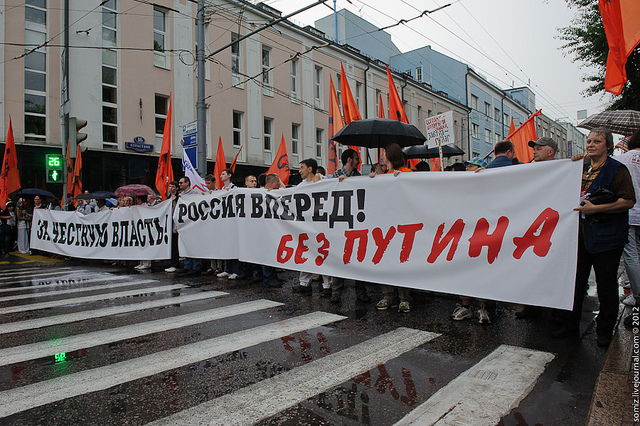
Moscow’s second March of Millions took place on Tuesday despite two severe storms that struck the capital — one was of meteorological origin, while the other came directly from the Kremlin, in the form of a new and unconstitutional law promising huge fines and penalties for participation in street protests.
Tensions were extremely high, due in large part to the previous day’s police raids on the homes of several prominent activists. Alexey Navalny, Ilya Yashin and Sergey Udaltsov were subpoenaed to the public prosecution office, where all but the left-wing leader Udaltsov — who ignored the order and joined his supporters in the streets — were detained for the entire day of the march.
By early morning, Moscow seemed to be on the brink of war, with its streets occupied by police vans crammed full of anti-riot squads. The Russian government gathered about 12,000 police to follow the march. The officers, ironically, were required to wear ceremonial white uniforms — the same color as the protest movement — because June 12 was also a national holiday, Russia Day, celebrating the nation’s independence from the Soviet Union.
The situation looked ominous until hundreds of people with flags, banners and placards began flowing through the center of the city, from Pushkin Square to Akademika Sakharova Avenue — named after the famed Russian Nobel laureate and Cold War dissident Andrei Sakharov. Within 50 minutes, 10,000 to 20,000 participants were reportedly on the streets. “We are here because irresponsibility is unlikely to help our children,” stated an elderly woman whose discontent with the government had spurred her to take action.
Even without key leaders like Yashin and Navalny, the level of organization and consolidation among the more than 100,000 people who eventually joined the march marked a step forward for the protest movement. Such mutual respect and commitment to cooperation were not as present in previous rallies, where participants divided themselves along several lines: education (teachers, professors, students and pupils), left-wing politics (Solidarnost, the Left Front, nationalists, anarchists), right-wing politics, LGBT, etc. Despite such a variety of movements and ideologies, no clashes, strikes or provocations took place this time. As one protester noted, “Sometimes there is no use forcing [conflict] when there is nowhere to force. Talking and listening is enough.”
There was no need even to remind people of the need for mutual respect and tolerance. Remarkably, the police batons and water cannons were left untouched. Various opposition social and political analysts pointed out some artificiality in such behavior from both sides, characterizing the studied politeness as a reaction to the show of muscle, imprudence and harsh government repression undertaken during the first March of Millions.
Nevertheless, the protesters managed to express their demands. Opposition activist Evgenia Chirikova, renowned for leading the fight to save Moscow’s Khimki Forest, read aloud the movement’s newly adopted manifesto, which includes a call for a new law for more transparent parliamentary elections (as well as a new round of parliamentary elections in turn), a new Russian Constitution limiting presidential powers, a finite limit to the presidential term of either one six-year term or two four-year terms, more authority given to the Members of Parliament, laws that allow for local self-government and direct governors’ elections, as well as reforms in the court and law-enforcement systems. The manifesto also emphasized a relatively high level of public opposition to the state stemming from the gap in standards of living. “As a peaceful mass we have a legal constitutionally bestowed right to protest against the rotten regime and for social as well as political changes,” concluded Chirikova.
Despite the relative calm and hopeful tone of the day’s events, it should be noted that many Russian independent and opposition publications including Dozhd Channel, Novaya Gazeta and Echo Moskvi reported distributed denial of service (DDoS) attacks against their websites on June 12. Russian authorities are notoriously well-known for using these attacks as an instrument of pressure or blocking access to anti-government information. While independent media was inundated with DDoS, protesters had to rely heavily on social media to coordinate and share their experiences — even as hundreds of people on the government payroll, known as “Putin’s bots,” were allegedly trolling the Twitter hashtag #June12.
Whether this had any effect on the day’s events is unclear, at least judging from the surprisingly large turnout. By early evening, as the heavy rains set in, the crowd started to disperse while chanting “Russia without Putin,” as if aspiring to make a final point and manifest their demands as decisively as possible. A few persistent protestors decided to brave the elements and stick around for the planned rock concert, which was billed as “true rock for fair elections.”
While the late-night festivities were more or less a washout, it is clear that the day’s opening act — a hundred thousand people in the streets of Moscow — rocked the regime with an unexpectedly civil showing of mass protest and police restraint.
